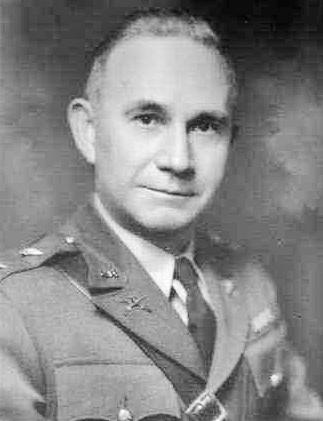

George Hatton Weems
Commander 22nd Infantry Regiment
4th Motorized Division
November 12, 1941 - February 17, 1942
George Hatton Weems was born in Southside, Montgomery County, Tennessee on September 27, 1891.
He entered the U.S. Military
Academy on June 14, 1913. Because of the U.S. entry into World
War I he and
his class were graduated early on April 20, 1917. He graduated 94
out of a class of 140. His best subjects were
Drill Regulations and Law and his worst subjects were Civil
Engineering and Spanish. In his final year he was a
Captain of Company F of the Corps Organization of Cadets.
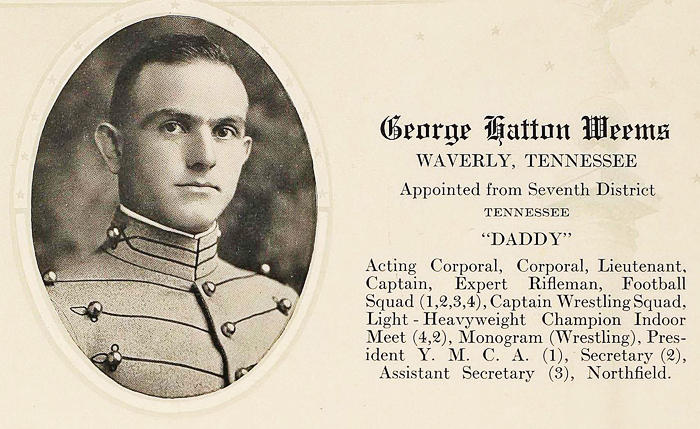
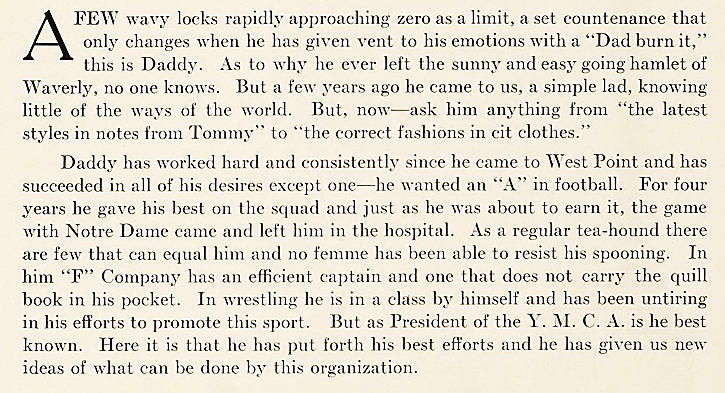
Above: The entry for George H. Weems in the U.S. Military Academy yearbook the Howitzer 1917
Upon graduation Weems was
commissioned a 2nd Lieutenant in the 9th Infantry. The 9th
Infantry was then part of the
2nd Division which was hurriedly forming up to move overseas to
France. A little over a month after his graduation
and commission he was promoted to 1st Lieutenant. He served with
the 9th Infantry at the camp at Syracuse, New York
as they got ready to deploy overseas from June 15 to September 5,
1917.
On August 5, 1917 Weems was given a promotion to the temporary rank of Captain of the 9th Infantry.
He left the United States on September 6 and landed in France on September 22, 1917.
Weems commanded the Machine Gun
Company of the 9th Infantry when it took over the trench sector
near Verdun
March 15 to May 2, 1918. He led the Company during the battle of
Château Thierry and at the capture of Vaux from
May 28 to July 8, 1917 where he received a Silver Star Citation
for his gallantry and leadership. From July 15 to
November 26, 1918 he was an instructor at the Army (Officers)
Candidates School at Langres, France.
He rejoined his Regiment on the Rhine on December 11, 1918 and moved with it into Germany on occupation duty.
He was offered a promotion to
the temporary rank of Major of Infantry (U.S.A.) on May 5, 1918
which he accepted
the next day on May 6. He remained on occupation duty with the
9th Infantry until July 19, 1919.
Weems returned to the U.S. and was the commander of the 4th Machine Gun Battalion at Camp Travis, Texas.
On September 9, 1919 he was
promoted to the rank of Captain in the Regular Army. He was
honorably discharged
as a Major from the U.S.A. on June 30, 1920 and returned to the
grade of Captain. He left Camp Travis in August 1920
and was at Fort Benning, Georgia from 1920-1922 where he was an
Instructor in Machine Guns. He attended the Infantry
School at Fort Benning from 1922-1923 where he was a student
officer in the Company Officers' Course from which he
graduated in 1923.
Captain George H. Weems President of the Company Officers Course Class Fort Benning, Georgia 1923 Photo from: THE DOUGHBOY 1923, Published
by the Classes of 1923, |
|
|
Captain George Weems at the During 1922-1923, in addition
to being President of his The team played against a
number of college teams Photo from: THE DOUGHBOY 1923, Published
by the Classes of 1923, |
From 1923 to 1927 Weems was
Professor of Military Science and Tactics at Davidson College,
North Carolina.
In 1927 he reported to the Command and General Staff School at
Fort Leavenworth, Kansas as a student officer.
He graduated from the School in 1928 and was placed on the
General Staff Corps Eligible List. From 1928 to 1929
he was at the U.S. Military Academy at West Point, New York where
he was an Assistant Instructor in the Department
of Tactics from June 27, 1928 to June 23, 1929. In 1928 Weems was
presented with the Distinguished Service Cross
for his actions in WWI. The ceremony was held at West Point on
the parade field before the assembled Corps of
Cadets who then marched in parade as Weems commanded their
review.
Weems was at the Air Corps
Tactical School at Langley Field, Virginia where he was
Instructor in Infantry Tactics
from 1929 to 1931. When the school moved to Maxwell Field at
Montgomery, Alabama in 1931 Weems went with
the school and continued as an instructor there.
On December 1, 1932 he was promoted to Major.
In 1932 he organized the G.H.
Weems Educational Fund to aid deserving students
who are unable to finance their college education.
He left the Air Corps School in
1933 and from 1933-1934 he was at Washington, D.C. as a student
officer at the
Army War College. In July and August 1934 he was a student
officer at the Chemical Warfare School at Edgewood
Arsenal, Maryland.
From September 1934 to September
1935 Weems was the Executive Officer of the 22nd Infantry at Fort
McClellan,
Alabama and also Executive Officer of Fort McClellan.
In September 1935 he was
detailed to the General Staff Corps. He served as the G-3
Assistant Chief of Staff
Operations Officer for 2nd Division at Fort Sam Houston, Texas
from September 1935 to May 1939.
|
Major George H. Weems Photo taken at Kelly Field, At this time Weems was G-3 Van Hatton Slayden finished a
career Photo from The Baltimore Sun newspaper |
Weems' next assignment was as
Chief of the U.S. Military Mission to the Republic of Haiti, for
which he held
the assimilated rank of Colonel. He was stationed in
Port-au-Prince, Haiti for the next two years.
On July 1, 1940 Weems was promoted to Lieutenant Colonel in the Regular Army.
On January 9, 1941 he was
offered a promotion to the temporary rank of Colonel (AUS) which
he accepted
on January 15, 1941. He vacated this temporary promotion on June
14, 1941.
On November 12, 1941 Weems
assumed command of the 22nd Infantry, then at Fort Benning,
Georgia with the
4th Motorized Division. On December 11, 1941 he was again offered
a promotion to the temporary rank of Colonel (AUS)
which he accepted on December 13. He relinquished command of the
22nd Infantry to Colonel Hervey S. Tribolet on
February 17, 1942.
In March 1942 he became the
Assistant Commandant of the Infantry School at Fort Benning,
Georgia.
He continued in this position on and off through 1945 while
taking time to perform special missions
abroad for the War Department. For his service at the Infantry
School during this period he was awarded
the Legion of Merit.
Weems was promoted to the temporary rank of Brigadier General (AUS) on September 10, 1942.
He was on a special mission to
the European Theater of Operations from November 1944 to January
1945.
From August to November 1945 he was on a special mission to the
Philippines and was in Manila on V-J Day.
Weems was promoted to Colonel in the Regular Army on December 28, 1945.
He was the Chief of the U.S.
Military Representation on the Allied Control Commission for
Hungary from
1946-1947.
On April 2, 1947 his temporary
rank of Brigadier General (AUS) expired and he reverted to his
Regular rank
of Colonel.
From 1947 to 1949 he was the Provost Marshall of European Command in Germany.
In 1949 he was at Atlanta, Georgia as the Chief of the Georgia Military District.
On September 30, 1951 Weems retired from the Regular Army with the rank of Brigadier General.
He died on February 25, 1957 at Fort Campbell, Kentucky.
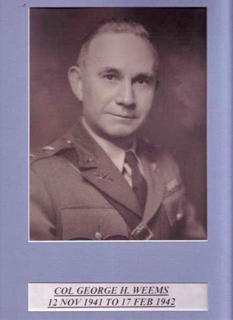
This portrait of Colonel Weems hung on
the wall at 1st Battalion 22nd Infantry Headquarters
at Fort Hood, Texas, 1999-2009.
Photo by anneagee from Ancestry.com
**********************
BIOGRAPHICAL SKETCH
Brigadier General George H. Weems
Brigadier General George Hatton
Weems, chief of the United States Representation on the Allied
Control Commission for
Hungary, Budapest, was born at Southside, Tennessee, on September
27, 1891. He attended Waverly High School (Tennessee),
and Southwestern Presbyterian University in Clarksville,
Tennessee.
General Weems was graduated from
the United States Military Academy, West Point, in the first war
class, April 20, 1917,
just two weeks after the United States entered World War I. He
sailed for France in September of that year as commander
of a machine gun company in the Ninth Infantry of the Second
Division.
Weems saw action at Verdun and
Chateau Thierry sectors and was awarded the Distinguished Service
Cross (D. S. C.)
after the capture of Vaux. During the latter part of the war he
served as an instructor at the officer Candidate School
at Langres, France. He rejoined his regiment on December 13,
1918, and served with the Army of Occupation of Germany
until July 19, 1919. In addition to the D. S. C. Weems was
awarded the Silver Star, French Croix de guerre with Corps
Citation, and the order of the Crown of Italy. Other decorations
held by General Weems are the order of Honor and Merit
from Haiti, the Order of merit from Brazil, and the Order of
Condor of the Andes, Bolivia.
Back in the United States he
served at Camp Travis, Texas, for a short time and then went to
the Infantry School at
Fort Benning, Georgia, as a student and instructor. He remained
at the school for three years and in 1923 was assigned
to Davidson College (North Carolina) as professor of Military
Science and Tactics. General Weems remained there
four years after which he attended and was graduated from the
Command and General Staff School at fort Leavenworth, Kansas.
Weems was assigned to West Point
as an instructor in tactics during 1928 and 1929. From there he
went to Langley Field,
Virginia, as an instructor in the Air Corps Tactical School. He
was promoted to major in 1932 and was graduated from the
Army War College in 1934.
From 1935-1939 he was Plans and
Training Officer for the Second Division at Fort Sam Houston,
Texas. He was appointed
head of the United States Military Mission to Haiti in 1939 and
was director of Haiti's Military Academy for two years.
For his service he was awarded the Haitian Medal, Honeur et
Merite, the highest medal of the Haitian Republic.
Returning to the United States
in 1941, Weems was assigned to the command of the 22nd Infantry,
Fourth Motorized
Division, then at Camp Gordon, and attended the Infantry School
as Assistant Commandant in March 1942.
As Assistant Commandant at the Infantry School, General Weems was
instrumental in training more than 60,000
young Second Lieutenants of Infantry, as well as thousands of
officers and enlisted personnel.
During the winter of 1944-1945,
General Weems was sent to the European theater on a special
mission for the
War Department. He was in the Philippines in 1945 on another
special mission for the War Department and was in
Manila on V-J Day. Upon his return from the Philippines he headed
the Board of Officers at Camp Blanding, Florida,
to interview applicants for the regular allied Control commission
for Hungary where he succeeded his good friend
Major General William S. Key.
Above biographical sketch from:
the Tennessee State
Library and Archives, where the
George Hatton Weems Papers, 1912-1957
are part of the State of Tennessee Department of State
Collections.
Though a couple of dates in the above sketch
conflict with the information found in the Official Army
Registers and
Cullum's Biographical Registers of the U.S. Military Academy, it
is presented here in its original form since it provides
additional details not found in other accounts.
**********************
The following is the citation for the award of the Distinguished Service Cross to George H. Weems:
The President of the United
States of America, authorized by Act of Congress. July 9, 1918,
takes pleasure in presenting
the Distinguished Service Cross to Captain (Infantry) George H.
Weems, United States Army, for extraordinary heroism
in action while serving with Machine-Gun Company, 9th Infantry
Regiment, 2d Division, A.E.F., at Vaux, France,
July 1 -2, 1918. In command of Machine-Gun Company, 9th Infantry,
Captain Weems personally took charge
of his advanced positions and manned captured enemy machine guns
on an exposed flank of the battalion.
By his coolness and daring in fearlessly exposing himself to the
enemy fire in order that he might personally
direct the fire of his guns, he succeeded in breaking down the
counterattack of the enemy upon
the exposed flank of his battalion.
General Orders: War Department, General Orders No. 14 (1928)
The following is the citation for the award of the Distinguished Service Medal to George H. Weems
The President of the United
States of America, authorized by Act of Congress July 9, 1918,
takes pleasure in presenting
the Army Distinguished Service Medal to Brigadier General George
Hatton Weems (ASN: 0-5297), United States Army,
for exceptionally meritorious and distinguished services to the
Government of the United States, in a duty of great
responsibility as U.S Military Representative on Allied Control
Commission for Hungary from May 1946 to September 1947.
General Orders: Department of the Army, General Orders No. 7
(October 14, 1947)
The following is the citation for the award of the Legion of Merit to George H. Weems
Brigadier General George Hatton
Weems (ASM O-5297), United States Army, was awarded the Legion of
Merit
for exceptionally meritorious conduct in the performance of
outstanding services to the Government of the United States
as Assistant Commandant of the Infantry School from 1942-1945.
General Orders: War Department, General Orders No. 110 (1945)
The following is the citation for the award of the Silver Star Citation to George H. Weems
By direction of the President,
under the provisions of the act of Congress approved July 9, 1918
(Bul. No. 43, W.D., 1918)
Captain (Infantry) George Hatton Weems, United States Army, is
cited by the Commanding General, American Expeditionary
Forces, for gallantry in action and a silver star may be placed
upon the ribbon of the Victory Medals awarded him.
Captain Weems distinguished himself by gallantry in action while
serving with Machine-Gun Company, 9th Infantry Regiment,
2d Division, American Expeditionary Forces, in action at Vaux,
France, 1 July 1918, and by his brilliant leadership.
General Orders: GHQ, American Expeditionary Forces, Citation
Orders No. 5 (June 3, 1919)
The "Silver Star Citation"
listed above was orginally called the "Silver Citation
Star".
Cited for gallantry in action, the Silver Star Citation entitled
Weems to wear a small silver star device
on the ribbon of his WW1 Victory Medal.
In 1932, when the Silver Star Medal was
officially created, the Department of the Army authorized holders
of the
Silver Citation Star, or Silver Star Citation, to have their
awards converted to the Silver Star Medal. At some unknown date
Weems had his award converted, as the Silver Star Medal is in the
display of his original medals at the Tennessee State Museum.
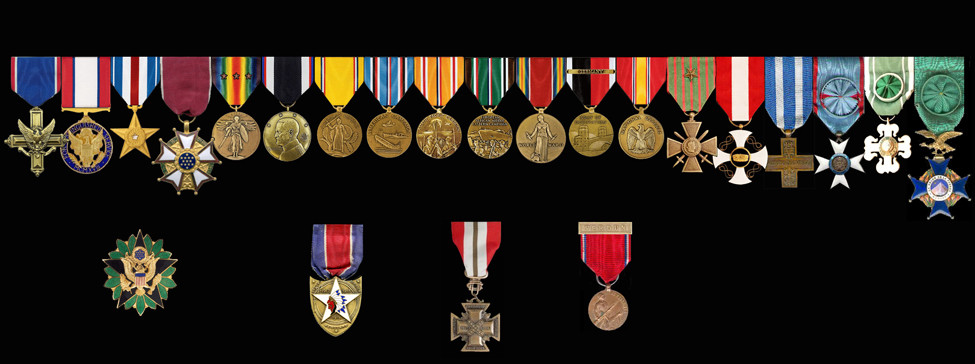
George H. Weems' decorations
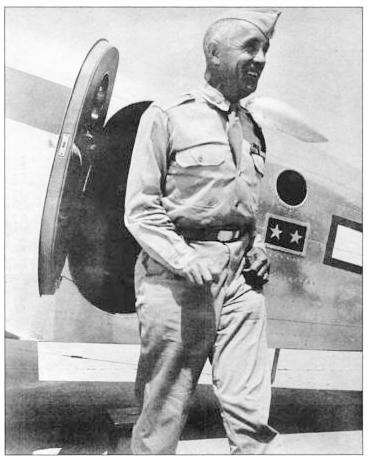 ³
³
Brigadier General George Weems during World War II

Christmas card sent by George H. Weems, as Brigadier General, circa 1942-1951 ¹
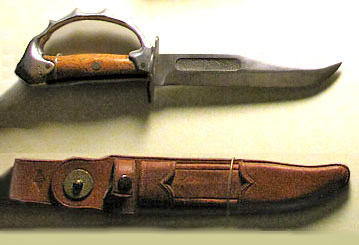
A Bowie-styled hunting knife with added
knuckles to the handle, carried by
George H. Weems (most likely during his service in WWI). This
personal
knife of Weems was included in a display at the Tennessee State
Museum
(Military Branch) entitled "Weapons of Last Resort".
Photo from the WW2HQ World War 2 Headquarters website
|
Brigadier General George H. Weems in Hungary 1946-1947 |
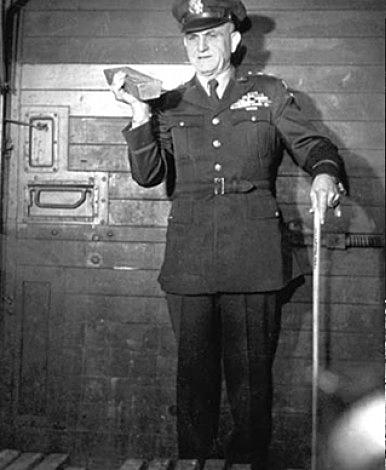
Brigadier General George H. Weems in
Hungary aboard a train
holding a bar of Hungarian gold assets confiscated by the Nazis
and returned to Hungary after the war in August 1946.
From the KORKEP.SK website
**********************
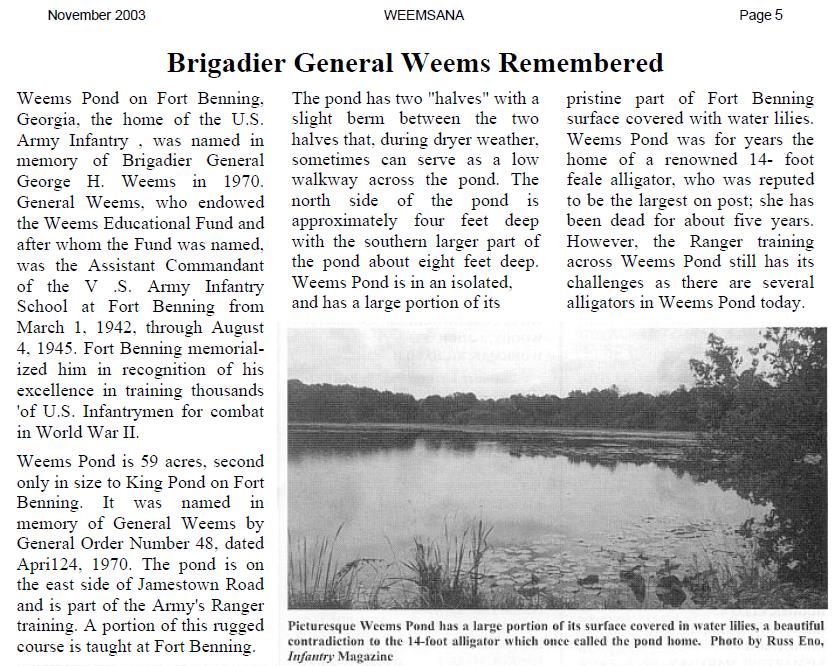
Above article from the publication WEEMSANA Volume XXXXIX, Number 1
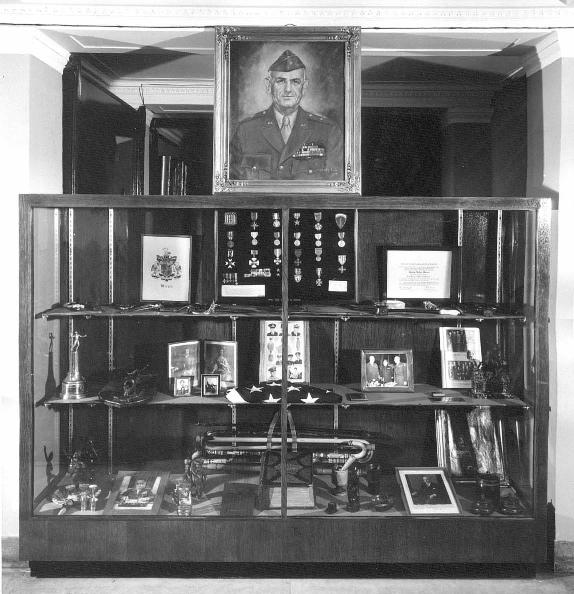 ²
²
George Hatton Weems exhibit, Tennessee State Museum (War Memorial Building), Nashville, Tenn.
Photo from the TSLA website
**********************
|
The obituary for George H.
Weems From the Find A Grave website: |
George Hatton Weems is buried at Arlington National Cemetery
He was interred on March 1, 1957
Section 1 Grave 894-A
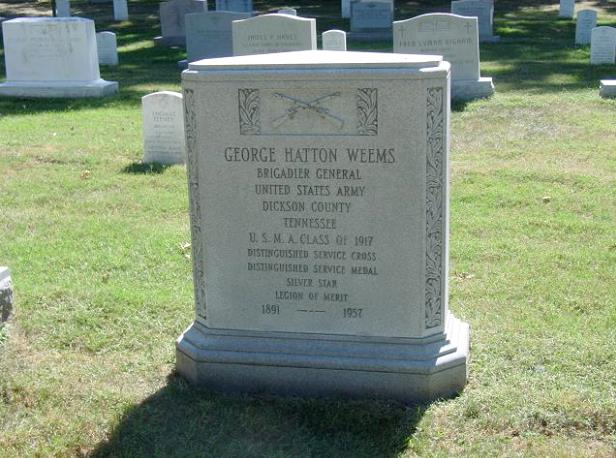
The grave marker for Brigadier General
Weems in Arlington Cemetery
photo by Russ Jacobs, from the Find A Grave website: Find
A Grave
¹ Clarksville in Vintage Postcards by Billyfrank Morrison, Arcadia Publishing 2004
² TSLA Tennessee State Library and Archives
³ Fort Campbell in Vintage Postcards by Billyfrank Morrison, Arcadia Publishing 2005
Additional Sources:
Official Army Registers 1917-1952
Adjutant General's Office
BIOGRAPHICAL REGISTER of the OFFICERS AND
GRADUATES of the U.S. MILITARY ACADEMY
at West Point, New York, Since Its Establishment in 1802 by
Brevet-Major-General George W. Cullum
Supplement VOL. VII-A 1920-1930,
Supplement VOL. VIII 1930-1940,
Supplement VOL. IX 1940-1950
Home | Photos | Battles & History | Current |
Rosters & Reports | Medal of Honor | Killed
in Action |
Personnel Locator | Commanders | Station
List | Campaigns |
Honors | Insignia & Memorabilia | 4-42
Artillery | Taps |
What's New | Editorial | Links |